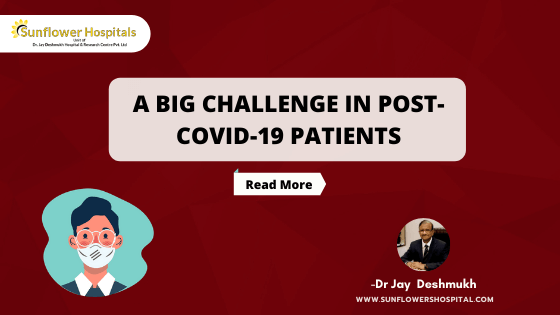Even after successful treatment of coronavirus infections, a lurking fear of some complications in post Covid recovery phase is posing a big stress and anxiety to the care providers.Some of these include lung fibrosis,unmasking of Diabetes , anxiety and depression and peripheral nerve weakness also known as Gullain Barre syndrome . One complication that stands out for its sheer complexity and that has become the nemesis of many patients of coronavirus has been a fungal infection known as black fungus or mucormycosis.Is mucormycosis common amongst individuals recovering from coronavirus infections ?
Besides India being the Diabetes capital of the world, India also has the dubious distinction of being the mucormycosis capital of the world. Mucormycosis has been closely associated with uncontrolled diabetes in COVID patients. Mucormycosis is also known as black fungus and is known to present in individuals with poor immunity. The black fungus is known to feed on glucose present in blood.
Generally who are at risk to get mucormycosis ?
Individuals who are Covid survivors with high blood glucose are most susceptible. High blood glucose may be due to uncontrolled diabetes or due to suboptimal treatment for diabetes.Steroids are known to make an individual more susceptible to get mucormycosis. This may occur in those individuals who receive high doses steroids for a longer period of time. Steroids also compromise the immune response.
What are the risk factors for an individual to get mucormycosis ?
All patients of mucormycosis have some underlying risk factors that influences the clinical presentation and predisposes to the infection. These include Diabetes particularly with ketoacidosis, treatment with steroids, blood malignancies, solid organ transplant, AIDS, treatment with deferoxamine and iron load. Individuals with multiple trauma, burns and malnutrition are also susceptible.
What are the main symptoms of mucormycosis ?
Pain around the eye, frontal headaches, pain on the face specially the cheek area and sometimes blackish nasal discharge associated with some swelling on face with redness is a common feature. This may be associated with fever, vomiting,blurred vision or even blindness. The sinuses of the face and forehead may become prominent and painful. At times there could be discolouration of palate and inside of the cheek.
How do you get this black fungus infection ?
This infection occurs due to inhalation of spores of this fungus.These lodge in the nostrils and further up in the sinuses. They multiple rapidly and erode the surrounding bones and soft tissues.They are invasive in nature and spread to the eyeball and the inside of brain in a matter of few days. These spores are present in damp air or in foul smelling environment. High levels of glucose in blood and indiscriminate use of steroids encourage the spread and multiplication of this fungus.The pattern in coronavirus survivors is known as Rhino-orbital- cerebral mucormycosis.
How to diagnose mucormycosis ?
The clinical presentation is quite unique and cannot be missed.The greatest challenge is how to diagnose it early and initiate remedial measures. Besides clinical examination, CT scan or MRI of the paranasal sinuses , orbit and brain and examination by ear nose and throat specialist suffices.A high index of suspicion is the rule.
How can you prevent mucormycosis ?
Avoid getting SARS -COV -2 infection at any cost.This is achieved by double masking and proper vaccination against coronavirus infection. In hospitalised patients steroids are used to take care of severe inflammatory response to coronavirus infection. Some coronavirus infected individuals have high blood glucose due to uncontrolled diabetes or blood glucose increases in them due to steroids.Treatment of diabetes by insulin, limiting the use of steroids to about less than a week and that too low doses is important. Care givers need to audit their prescription on daily basis for their hospitalised patients. Maintaining a normal blood glucose and limiting the dose and duration of steroids are important. Avoiding higher antibiotics on long term basis and particularly as prophylactic therapies should be best avoided.
How is mucormycosis treated ?
After establishing a diagnosis of mucormycosis, steroids and higher antibiotics are avoided. Blood glucose levels are optimised. Surgical debridement of the fungus is done by ENT surgeon mostly through the nostrils and nasal passage. Sometimes the eyeball needs to be removed in case the fungus spreads there. In case the black fungus spreads to the brain, a neurosurgical procedure is advisable.
What are the drugs used ?
Anti fungal drugs like Amphoterecin B or their lysosome forms are the drugs of choice. They are given intravenously and the treatment needs to be well supervised as the side effect potential is high. Step down treatment in form of Posacanazole and Evacunazole has been advocated. All these are expensive drugs and they need to be given for a few months.
What can happen if mucormycosis is not treated ?
This fungal infection if not treated can easily spread to the eyes causing blindness and to the brain causing complications and early death. Infection of the stomach and kidneys has been reported.
After successful treatment of coronavirus infection certain complications like black fungus mucormycosis has been a huge challenge.Early diagnosis and treatment can prevent serious complications like blindness or death. Avoiding high dose steroids for long duration , controlling high blood glucose by insulin and avoiding unnecessary use of higher antibiotics as prophylactic therapy should be avoided. The overall management of mucormycosis is very expensive. Unfortunately mucormycosis is not likely to be the last major complication of COVID- 19 recovered patients.

9May
Categories :
COVID-19

